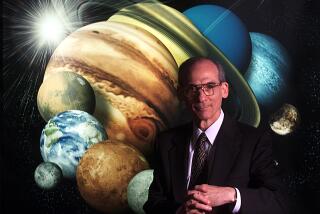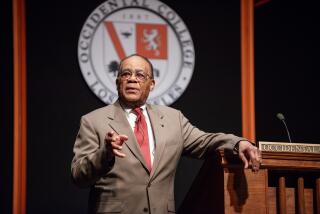Edwin McMillan; Helped Develop the Atomic Bomb
- Share via
EL CERRITO, Calif. — Edwin M. McMillan, a co-discoverer of plutonium who worked on the project that developed the atomic bomb and who was awarded the 1951 Nobel Prize for chemistry, has died at 83.
He died at his home Saturday after a long illness.
McMillan, a physicist who retired in 1973 as head of UC Berkeley’s Lawrence Berkeley Laboratory, last year was awarded the National Medal of Science, the nation’s highest award for scientific achievement.
He and nuclear chemist Glenn Seaborg won the Nobel Prize for their co-discovery of plutonium, or Element 94. The radioactive element found in 1940 made it easier and less costly to produce atomic bombs.
McMillan had earlier discovered neptunium, or Element 93, the first element heavier than uranium.
“I have known Ed McMillan as a friend and colleague since 1934,” Seaborg once said. “His important and versatile scientific contributions spanning physics, chemistry and engineering, and his great human qualities, form an important chapter in the history of science.”
McMillan also was a pioneer in the theory of phase stability, a concept that made giant modern linear accelerators possible. For that work, he shared the 1963 Atoms for Peace prize with Soviet scientist V. I. Veksler.
During World War II, McMillan helped develop radar and sonar devices for the Navy before working on the Manhattan Project in Los Alamos, N.M., which produced the world’s first atomic bomb.
Although he helped create nuclear weapons, he also had doubts about controlling them.
“This country has in its hands some incredibly powerful weapons,” he said. “The way our government deals with the question of nuclear disarmament is shameful--a disgrace to our nation.”
McMillan was also a major contributor to the development of the cyclotron, or atom smasher, used in the study of subatomic physics.
He became head of the Berkeley laboratory in 1958.
“He was incurably curious,” said one of his sons, Stephen McMillan. “He was an explorer. He wasn’t looking at what was known but what wasn’t.”
“Physics wasn’t work,” said his widow, Elsie. “He loved it. I said if I ever had a rival, it was physics.”
Other survivors include a daughter, another brother and three grandchildren.
McMillan was born in 1907 in Redondo Beach. He graduated from Caltech and earned a doctorate from Princeton University in 1932, the same year that he moved on to UC Berkeley.
He went to Berkeley as a National Research Fellow and quickly became involved in work with the late Dr. Ernest O. Lawrence at what was then a radiation lab. McMillan was appointed to the Berkeley faculty in 1935.






